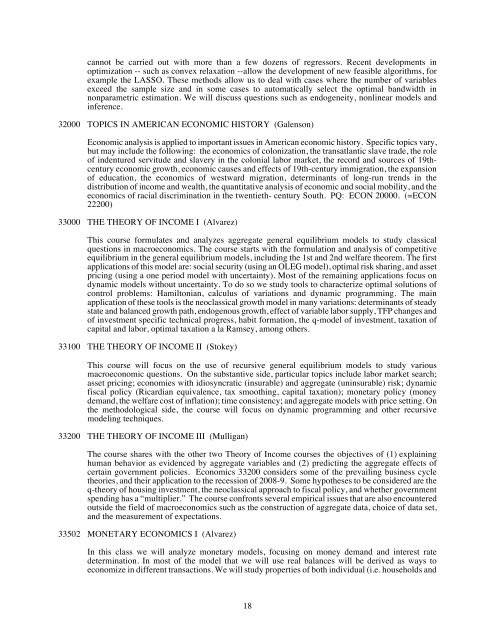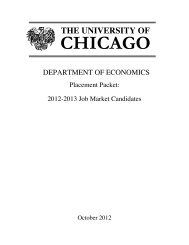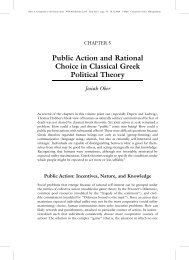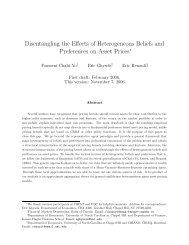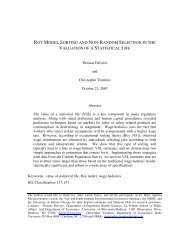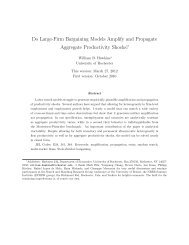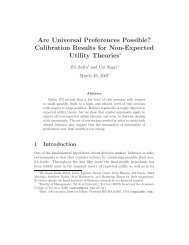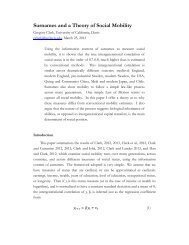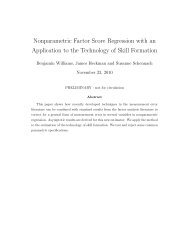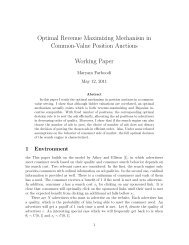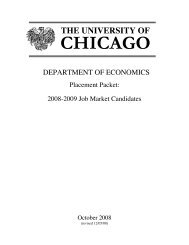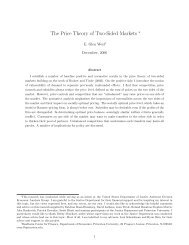Graduate Program Guidebook - University of Chicago Department of ...
Graduate Program Guidebook - University of Chicago Department of ...
Graduate Program Guidebook - University of Chicago Department of ...
Create successful ePaper yourself
Turn your PDF publications into a flip-book with our unique Google optimized e-Paper software.
cannot be carried out with more than a few dozens <strong>of</strong> regressors. Recent developments inoptimization -- such as convex relaxation --allow the development <strong>of</strong> new feasible algorithms, forexample the LASSO. These methods allow us to deal with cases where the number <strong>of</strong> variablesexceed the sample size and in some cases to automatically select the optimal bandwidth innonparametric estimation. We will discuss questions such as endogeneity, nonlinear models andinference.32000 TOPICS IN AMERICAN ECONOMIC HISTORY (Galenson)Economic analysis is applied to important issues in American economic history. Specific topics vary,but may include the following: the economics <strong>of</strong> colonization, the transatlantic slave trade, the role<strong>of</strong> indentured servitude and slavery in the colonial labor market, the record and sources <strong>of</strong> 19thcenturyeconomic growth, economic causes and effects <strong>of</strong> 19th-century immigration, the expansion<strong>of</strong> education, the economics <strong>of</strong> westward migration, determinants <strong>of</strong> long-run trends in thedistribution <strong>of</strong> income and wealth, the quantitative analysis <strong>of</strong> economic and social mobility, and theeconomics <strong>of</strong> racial discrimination in the twentieth- century South. PQ: ECON 20000. (=ECON22200)33000 THE THEORY OF INCOME I (Alvarez)This course formulates and analyzes aggregate general equilibrium models to study classicalquestions in macroeconomics. The course starts with the formulation and analysis <strong>of</strong> competitiveequilibrium in the general equilibrium models, including the 1st and 2nd welfare theorem. The firstapplications <strong>of</strong> this model are: social security (using an OLEG model), optimal risk sharing, and assetpricing (using a one period model with uncertainty). Most <strong>of</strong> the remaining applications focus ondynamic models without uncertainty. To do so we study tools to characterize optimal solutions <strong>of</strong>control problems: Hamiltonian, calculus <strong>of</strong> variations and dynamic programming. The mainapplication <strong>of</strong> these tools is the neoclassical growth model in many variations: determinants <strong>of</strong> steadystate and balanced growth path, endogenous growth, effect <strong>of</strong> variable labor supply, TFP changes and<strong>of</strong> investment specific technical progress, habit formation, the q-model <strong>of</strong> investment, taxation <strong>of</strong>capital and labor, optimal taxation a la Ramsey, among others.33100 THE THEORY OF INCOME II (Stokey)This course will focus on the use <strong>of</strong> recursive general equilibrium models to study variousmacroeconomic questions. On the substantive side, particular topics include labor market search;asset pricing; economies with idiosyncratic (insurable) and aggregate (uninsurable) risk; dynamicfiscal policy (Ricardian equivalence, tax smoothing, capital taxation); monetary policy (moneydemand, the welfare cost <strong>of</strong> inflation); time consistency; and aggregate models with price setting. Onthe methodological side, the course will focus on dynamic programming and other recursivemodeling techniques.33200 THE THEORY OF INCOME III (Mulligan)The course shares with the other two Theory <strong>of</strong> Income courses the objectives <strong>of</strong> (1) explaininghuman behavior as evidenced by aggregate variables and (2) predicting the aggregate effects <strong>of</strong>certain government policies. Economics 33200 considers some <strong>of</strong> the prevailing business cycletheories, and their application to the recession <strong>of</strong> 2008-9. Some hypotheses to be considered are theq-theory <strong>of</strong> housing investment, the neoclassical approach to fiscal policy, and whether governmentspending has a “multiplier.” The course confronts several empirical issues that are also encounteredoutside the field <strong>of</strong> macroeconomics such as the construction <strong>of</strong> aggregate data, choice <strong>of</strong> data set,and the measurement <strong>of</strong> expectations.33502 MONETARY ECONOMICS I (Alvarez)In this class we will analyze monetary models, focusing on money demand and interest ratedetermination. In most <strong>of</strong> the model that we will use real balances will be derived as ways toeconomize in different transactions. We will study properties <strong>of</strong> both individual (i.e. households and18


